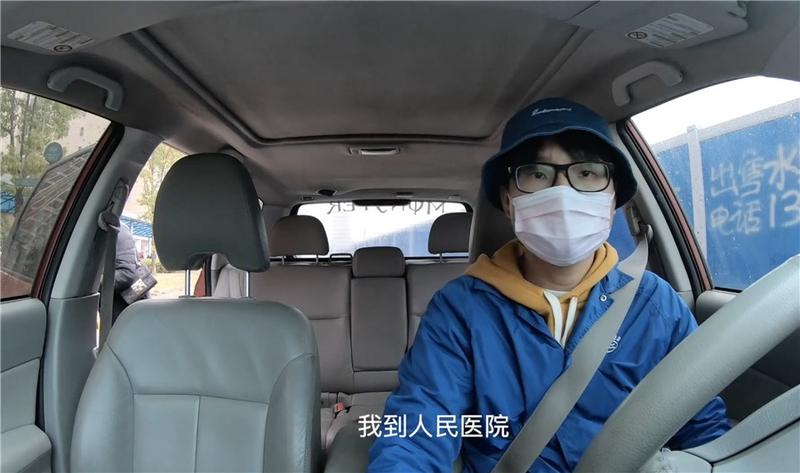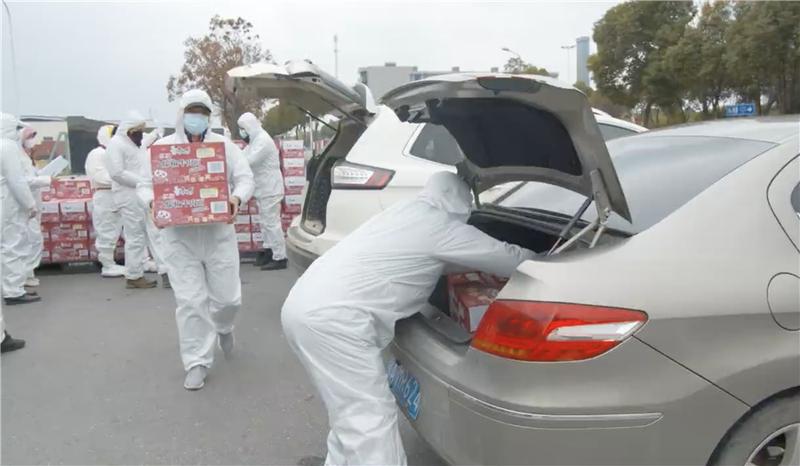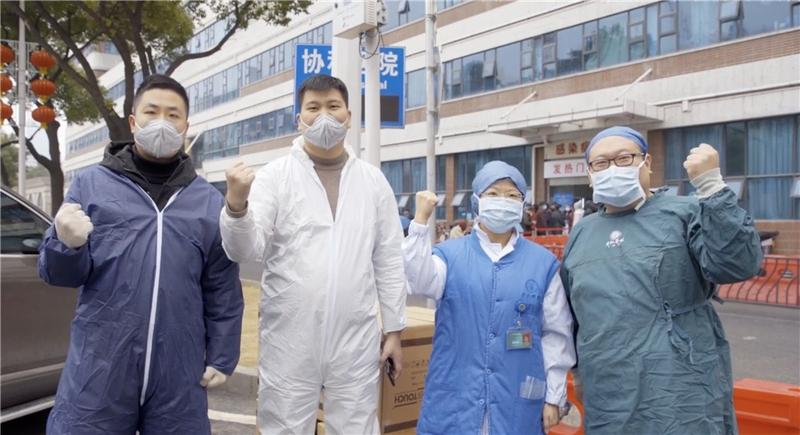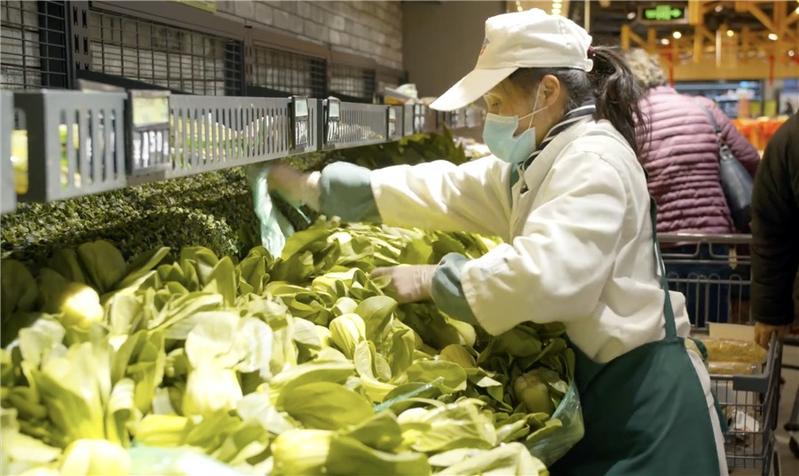 Zhizhu Houmianbao (online name) reveals in his vlog series, Wuhan Diaries 2020, how the local residents cope with their daily lives and help each other amid the crisis. (PHOTO PROVIDED TO CHINA DAILY)
Zhizhu Houmianbao (online name) reveals in his vlog series, Wuhan Diaries 2020, how the local residents cope with their daily lives and help each other amid the crisis. (PHOTO PROVIDED TO CHINA DAILY)
A vlogger's clips of Wuhan, the epicenter of the novel coronavirus outbreak, are captivating public attention, chronicling volunteer efforts and conveying hope.
The city was the same but looked different. As he drove through Wuhan, a 37-year-old independent filmmaker surnamed Lin said: "It feels strange. When I pass an intimately familiar street that's suddenly empty, I can barely tell where it is."
The capital of Hubei province, which is the center of the novel coronavirus outbreak, was put under lockdown on Jan 23, one day before Lunar New Year's Eve
The capital of Hubei province, which is the center of the novel coronavirus outbreak, was put under lockdown on Jan 23, one day before Lunar New Year's Eve.
Lin's instincts prompted him to upload a two-minute video clip of people's daily lives on the street and in the market-cautious yet orderly-to the micro-blogging platform, Sina Weibo.
He didn't expect the film would soon be viewed over 2 million times. A second clip he uploaded a day later quickly racked up 9 million views.
"I've always recorded my life through videos and photos," Lin says.
 Residents help transport donated food to hospitals. (PHOTO PROVIDED TO CHINA DAILY)
Residents help transport donated food to hospitals. (PHOTO PROVIDED TO CHINA DAILY)
"I didn't initially plan to make it a series. But I decided to continue when my videos got so much attention online."
Lin has uploaded 10 vlogs on Sina Weibo since the lockdown. Each of the first nine vlogs has drawn at least 1 million hits so far. He has named the series Wuhan Diaries 2020.
His follower numbers have surged from about 3,700 to over 2.3 million.
Lin's account on Sina Weibo is Zhizhu Houmianbao (meaning "spider baobab"). In the telephone interview with China Daily, he also asked to be credited as this online moniker rather than by his real full name.
 Volunteers and medical workers in Wuhan show confidence in their fight against the epidemic. (PHOTO PROVIDED TO CHINA DAILY)
Volunteers and medical workers in Wuhan show confidence in their fight against the epidemic. (PHOTO PROVIDED TO CHINA DAILY)
"Spider" became his nickname when he played in a band years ago. And "baobab" refers to his affection for travel and free living.
But even he felt gloomy as the outbreak dominated the news cycle. Lin recalls that he could hardly sleep for a few days after the lockdown.
"In the first days (of the outbreak), people were submerged in too many negative emotions," Lin says.
"Many spent their time viewing bad news online around the clock and weren't in the mood to do anything else. But I want to remind people of hope. Don't panic. It's better to face the virus in a more positive way."
 A once-bustling bridge over the Yangtze River is almost empty after the lockdown. (PHOTO PROVIDED TO CHINA DAILY)
A once-bustling bridge over the Yangtze River is almost empty after the lockdown. (PHOTO PROVIDED TO CHINA DAILY)
The suspension of public transportation in Wuhan has created challenges for medical workers' commutes and supply deliveries. Residents who own private cars have been volunteering to work as drivers.
Lin also became a driver on Jan 24, as is seen in his video blogs. Medical workers not only thank him with words. One gave him a N95 mask, an item that's urgently needed on the front line, when she disembarked.
The nurse asked Lin to protect himself and stay safe.
Lin says: "Of course, my family members all think it's dangerous to do this. But they understand my decision."
Lin says he hasn't responded to many netizens' offers to join the volunteers.
"Even a senior high school student said he wants to join," Lin says. "I told him: 'Stay home.' It's not something to do extemporaneously."
There are no official statistics on how many residents have become volunteers. Lin says some volunteers have told him there are as many as 40,000.
"I don't think the number is that large," he says. "But there must be many."
Every video receives comments supporting him but also expressing concern about volunteers' safety.
 A grocery store in the city center is packed with vegetables. (PHOTO PROVIDED TO CHINA DAILY)
A grocery store in the city center is packed with vegetables. (PHOTO PROVIDED TO CHINA DAILY)
Many reminded him to wear his mask properly after he once failed to do so.
Volunteers transport materials ranging from medicines and masks to bottled water and instant noodles.
They're aware of the risks.
"Someone has to take on this duty," volunteer Zhou Yiyu says in Lin's vlog. "We come to help, not to face doom."
Drivers park away from hospitals to unload from safe distances. They wear protective suits if they must go near.
Another unnamed volunteer, who appears in the vlog, says: "It's natural for us to occasionally feel fear. But we have nowhere to hide or escape to. Wuhan is our city."
Lin's videos show how other good Samaritans contribute.
For example, hostel owner Xiao Yajuan allows medical staff to stay in her place for free. The hostel has, in turn, become an information hub.
Volunteers have also undertaken crowdfunding campaigns to get urgently needed materials.
One volunteer provides free HIV/AIDS medication, which is being used by some hospitals to combat the new coronavirus, to patients' families.
And a restaurant near a hospital also provides about 100 free meals for medical workers every day.
"There's no particular reason for doing this," the owner says, smiling.
"It's just what we should do, especially when I have no business to run … I'll continue to deliver meals until everything is fine."
Lin becomes sullen when referring to the death of a volunteer driver on Feb 3. But he remains determined.
"There's always sacrifice in an outbreak like this," Lin says.
"What I can do is try my best to protect myself and people around me from getting infected. I sometimes feel tears in my eyes when shooting. But I don't stop recording. I feel at ease when editing the videos at home."
ALSO READ: Volunteer drivers show bravery on front line
He hasn't planned to turn the vlogs into a documentary or feature film.
"I don't think that far ahead," he says. "But I'll keep rolling out vlogs if I find things to record."
Lin asked a takeout-delivery man in one vlog: "What do you want to do most after this outbreak?"
The man responded: "To eat baozaifan (steamed rice in a clay pot) on the second floor of that shopping mall. It's so delicious!"
When asked the same question, Lin responds: "I'll rush to my girlfriend, who's not in Wuhan. We should have been together for the Lunar New Year's Eve banquet."
READ MORE: Fear and hope: Wuhan travelers recount life under quarantine
The crisis has changed some people's attitudes toward life. Some of his friends, who advocated being single, now hope to find romance or marriage.
"I used to often notice Wuhan's shortcomings," he says. "But my feelings toward the city have deepened. To live is a great thing."


